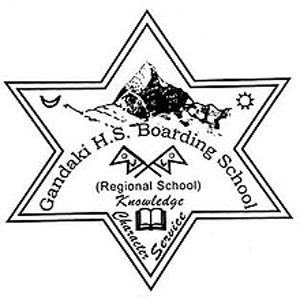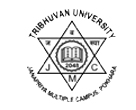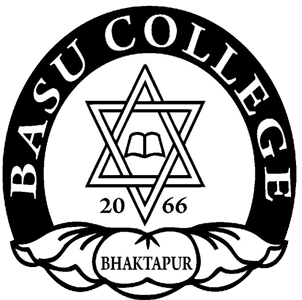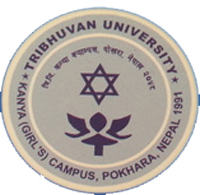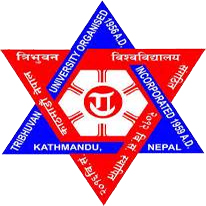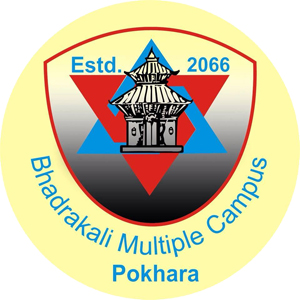Overview
Kalika Multiple Campus (KMC), Kajipokhari, Pokhara, Kaski, was established in 1991 AD (2048 BS) as a nonprofit, community-based higher educational institution affiliated with Tribhuvan University (TU). It was founded with the painstaking efforts and contributions of local people, organizations, educators, and academics. Since its formation, the local community has actively participated in the overall development of the campus. KMC is dedicated to offering quality education that is affordable to all.
Kalika Multiple Campus Pokhara is devoted to producing well-trained, skilled, and educated citizens capable of accelerating the productive and overall developmental activities required for the various spheres of the region and the nation. KMC recognizes the growing stratum of socio-economic growth and the changes when human resources are furnished with new attitudes, values, beliefs, ideas, aspirations, skills, and knowledge.
KMC is located in the southeastern part of the Pokhara Valley and is accessible from all the city's wards. Most students come from rural and remote areas and the surrounding districts, such as Tanahun, Gorkha, Lamjung, Syangja, Parbat, Baglung, Myagdi, Mustang, and other regions. KMC is famous for its low cost to students and high performance. It stands for quality education and result-based management.
Kalika Multiple Campus Pokhara now has an MBS and MARDS program at the master level and BBS, BA, and BED for bachelor and 1440 students, 32 and 15 teaching and non-teaching staff.
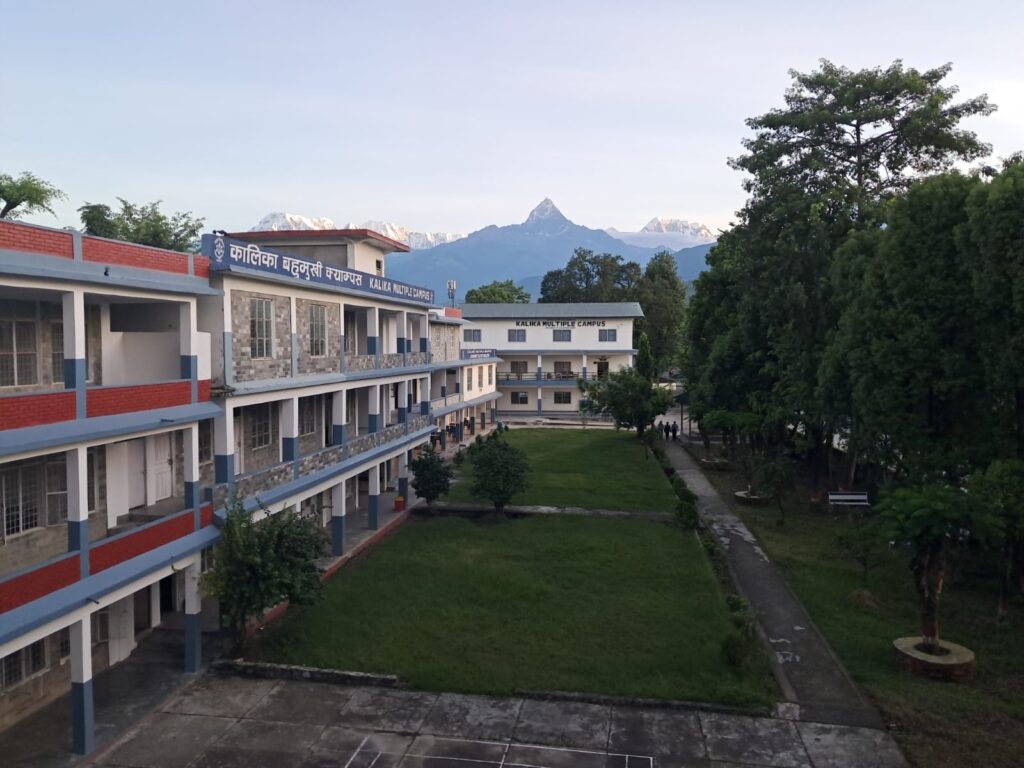
Kalika Multiple Campus (KMC), a QAA-certified community campus, was established by the collective effort of local academics and social activists. It is a nonprofit autonomous campus affiliated with Tribhuvan University (TU). Its campus has a proud heritage, excellent programs, and distinguished faculty. Since its establishment, the campus has been preparing students to confront global challenges. The campus is committed to ensuring quality education with its beautiful environment. Recognized by the UGC of Nepal, KMC has been awarded the "Quality Assurance and Accreditation" certificate. UGC support is one of the main components of the campus development. The campus has been successfully running its academic programs in compliance with the teaching/learning environment standards specified by TU. KMC is the first campus in Gandaki province to Provide a Master's Degree in Rural Development Studies (MARDS) affiliated with TU.
Vision
KMC intends to be a prestigious community-based campus of higher education in Nepal dedicated to academic excellence. It will offer people access to educational opportunities in different branches of knowledge.
Mission
The mission of Kalika Multiple Campus Pokhara is to provide people in the country with affordable access to higher education in different disciplines. The campus aims to evolve into academic excellence and aspires to be an educational hub of the Western region through continued focus on academic autonomy, program extension in non-technical and soft tech disciplines, and continued certification as a QAA-certified institution.
Goals
-
Physical Infrastructure Development
-
Faculty Development
-
Academic Excellence
-
Program Extension
-
Institutional Capacity Development
-
Students' Welfare and Extra-Curricular Activities
-
Campus Community Linkage
-
Financial Resource Development and Management
Eligibility for Admission
The aspirant candidate applying for BBS, BA, and BE.d programs must:
-
Secure at least a passed second division in the +2, PCL, or equivalent program from any educational board or institution recognized by TU.
-
Comply with all the application procedures.
Admission Criteria
(i) Written Test
Applicants are required to take the campus examination. To qualify for enrollment, students must secure a minimum score of 40%. The examination follows standard testing patterns and includes verbal ability, logical reasoning, quantitative ability, and general awareness.
(ii) Interview
Candidates are interviewed and selected for admission. Shortlisting is based on the written test.
| Criteria | Scores |
|---|---|
| Examinations | 25 Equivalent |
| S.L.C./S.E.E. | 25 Equivalent |
| +2/PCL | 50 Equivalent |
| Total | 100 Marks |
Learning/Teaching Pedagogy
Our teaching pedagogy includes class lectures, group discussions, field visits, practical exercises, laboratory work, and project work. The teaching faculty determines the methodology according to the course's needs.
KMC uses the Internet and multimedia projectors as teaching aids to facilitate the learning process. We also invite guest lecturers and speakers from the management and entrepreneurship fields.
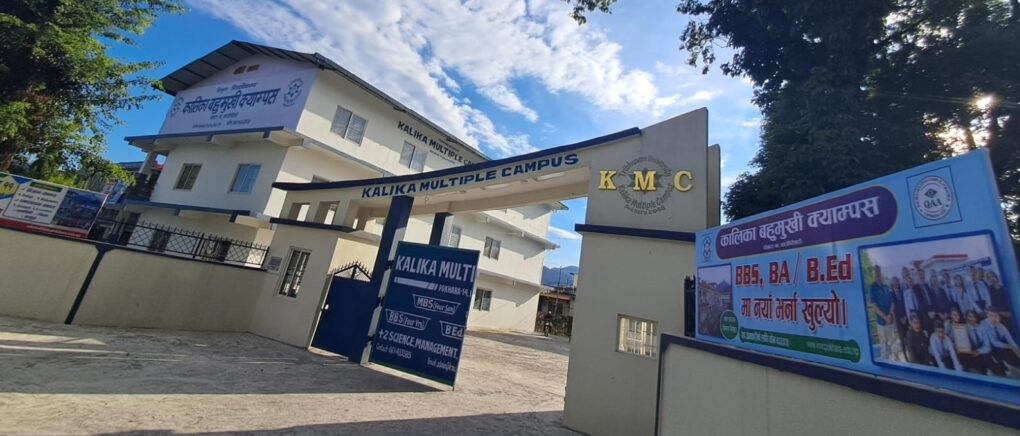
Facilities
-
KMC provides an up-to-date and well-furnished library to facilitate teaching and learning. It has many books, online libraries, periodicals, videos, and a growing collection of digital study materials.
-
Scholarships: Ten percent of the total number of students will be awarded scholarships, either fully or partially. (To be eligible for a scholarship, students must attend and pass internal and board exams.)
-
The premises of KMC have internet accessibility equipped with high-speed service providers.
-
Library
-
Wi-Fi
-
Connectivity
-
Classroom
-
Playground
-
Parking
-
Canteen
-
with fixed multimedia and projectors
-
Sanitary Napkin Vending Machine
-
Smart Living Technos
Evaluation and Examination System
The BBS, BA, and BEd programs require four years to complete the course. The TU Examination Board conducts the final exams annually, and the campus also conducts regular examinations for internal evaluation. Only students who fill out the exam form will be eligible to study the following year.
Attendance
Students must regularly attend lectures, practical classes, seminars, and presentations. To be eligible for the final examination, a candidate must have a minimum attendance of 80%.
Transfers
A student can transfer to TU-recognized universities with the permission of the concerned Dean's office.
Uniform
The uniform is compulsory for all students as prescribed by KMC:
-
Light sky blue white line shirt
-
Black pants/skirt
-
Black shoes
-
Dark black sweater/coat
-
Campus tie as provided by the campus administration
Code of Conduct:
Discipline is the prime concern of KMC. The students of KMC must maintain a high degree of discipline in their classes and on the college premises. The KMC code of conduct specifies the following rules and guidelines:
-
All students must enter the college in proper campus uniform.
-
At least 80% attendance is a must to be eligible to sit for the final exam.
-
It is strictly prohibited to get involved in unethical activities.
-
Punctuality in all campus activities is highly emphasized.
-
Clustering and other group formation by students that disrupt smooth and peaceful educational activities will be strictly addressed.
-
Misconduct and malpractice during class and exams will lead to expulsion from the campus.
-
Students must pay for any damages caused to college and campus properties, which may lead to expulsion.
-
Students are discouraged from visiting public places such as cinemas, pool houses, restaurants, and discos in campus uniform.
-
Students must possess the identity card issued by the campus throughout the session while attending the campus.
Academic Programs
10+2 Programs
-
Ten Plus Two (+2) Education - NEB Affiliated
-
Ten Plus Two (+2) Science - NEB Affiliated
-
Ten Plus Two (+2) Humanities - NEB Affiliated
-
Ten Plus Two (+2) Management - NEB Affiliated
Bachelor's Programs
-
Bachelor of Arts (BA) - TU Affiliated
-
Bachelor of Education (B.Ed) - TU Affiliated
-
Bachelor of Business Studies (BBS) - TU Affiliated
Master's programs
-
MA in Rural Development - TU Affiliated
-
Master of Business Studies (MBS) - TU Affiliated
Scholarship Information:
Kalika Multiple Campus, Pokhara-14 Kajipokhari Rules and Regulations 2058 (Second Amendment 2076). As per rules 4-12, the campus chief will coordinate forming a five-member scholarship selection committee. The committee will include the Assistant Campus Chief, Department Heads, a Representative of the Professors' Association, and a Student Representative. Through this selection process, up to 5 to 10 percent of students can receive full and partial scholarships.
The basis for providing scholarships will be as follows:
1. Meritorious (Internal Examination)
-
25 points for scoring above 65%
-
22 points for scoring above 55%
-
18 points for scoring above 45%
2. +2 Transcript Basis
-
25 points for scoring above 70%
-
15 points for scoring above 50%
3. Economically Disadvantaged (Interview Basis)
-
Extremely Poor: 25 points
-
Poor: 20-25 points
-
General Poor: 15-20 points
-
Slightly Poor: 10-15 points
4. Indigenous People - 5 points
5. Remote Area
-
Extremely Remote: 10 points
-
Rural Area outside Kaski District: 7 points
-
Rural Area within Kaski District: 6 points
-
Urban Area: 4 points
6. Female Students - 5 points
7. Disabled Students - 10 points
8. Dalit Students - 10 points
Students who fail the internal examination will not be eligible to participate in the scholarship distribution.
Contact Kalika Multiple Campus Pokhara's administrative office for detailed information on the course, admissions, location, fees, scholarships, facilities, counseling, or eligibility.
Contact Details
Kalika Multiple Campus
Email Address: info@kmcpokhara.edu.np
Phone Number: +977-61-433385
Website: http://kmcpokhara.edu.np
Location: Kajipokhari, Pokhara-18, Nepal


